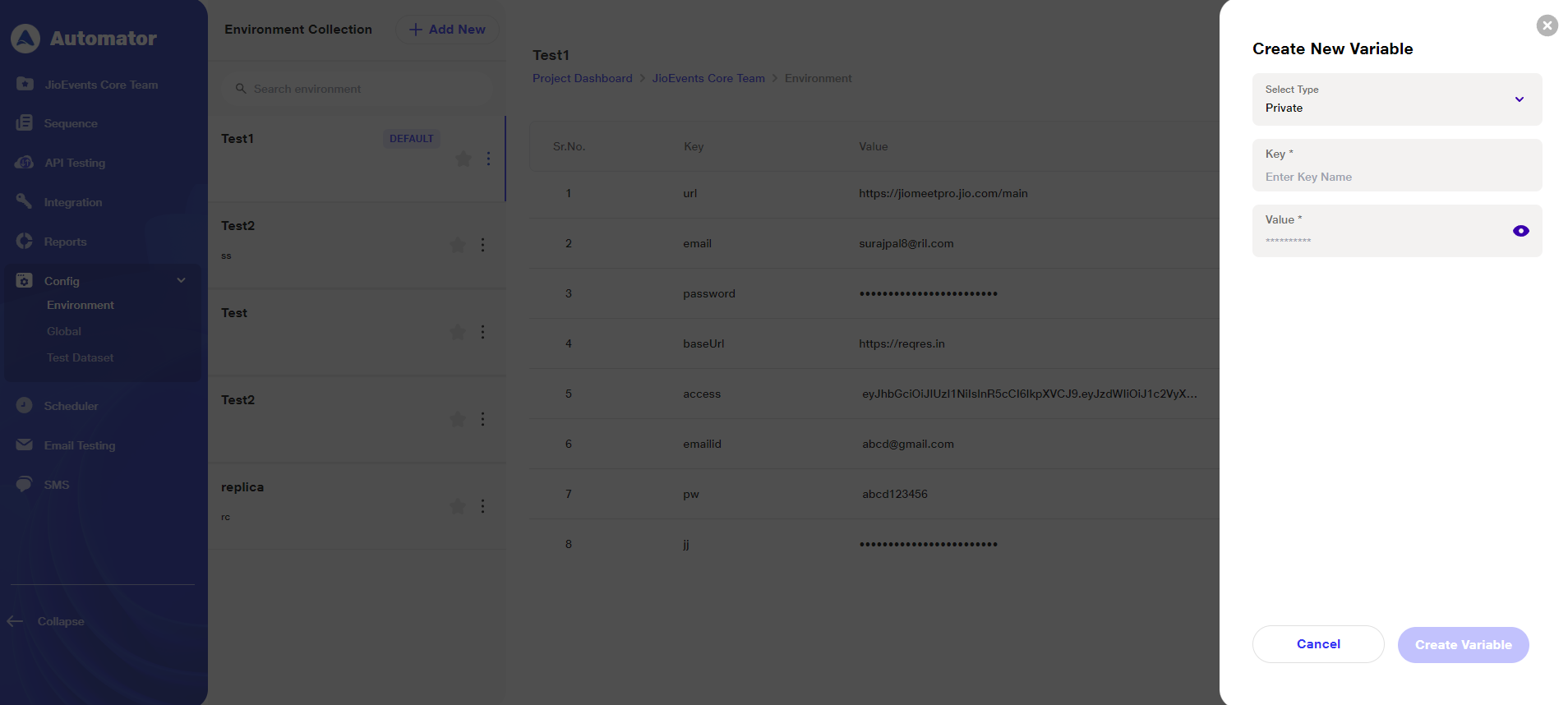Private variable:
Private Variables is a pivotal feature within the Automator designed to support data encapsulation and streamline workflow efficiency. This feature empowers users to safeguard sensitive information and optimize data management within automation processes.
It ensures security by restricting access to sensitive data like passwords and scenario steps, accessible only to the creator. Only the created user will be able to access the password and the scenario test step being called. Invited users won’t be able to run the scenario and not able to access the password.
Private variable type can be created in environment and global collection by selecting the private variable option from the select type dropdown field in the Create New Variable popup.
Once private variable is created the value will be in encrypted form

Accessibility of Private Variables for Users within the Same Organization
-
Creator Access:
a. If the user who created the private variable clicks on the eye icon of the value, the value should be decrypted (displaying the original value).
-
Other Users Access: If another user from the same organization tries to access the private variable:
a. Clicking on the eye icon will display the value in encrypted form.
b. Clicking on the copy action CTA will copy the encrypted value.
Usage of Private varibale in Scenario Steps
-
Creator Run:
a. If the user who created the private variable runs the scenario containing that step, it will work fine.
-
Other Users Run:
a. If another user from the same organization runs the scenario, that step should fail, giving an error ("User does not have access to used variable") in report logs.
b. If other user Hoverover the value of the private variable should not display the value.
Private variables in the reports section will be shown as asterisk (*) signs instead of the actual variable value, ensuring data privacy and preventing unintended interference or modification from external sources
Functioning of private type variable in Environments and Global:
-
Actual Admin:
a. Can see the encrypted password in reports and can edit or delete the private variable.
-
Invited Admin or Invited User with Write Access:
a. Can run the scenario but if private variable is used, the step fails, and the report shows "Unable to access the private variable."
b. When trying to edit the private variable, an error message will be given: "You are not authorized to view this value.
c. Can delete the private type from global variables but unable to delete the environment private variable.
-
Invited User with Read Access:
a. Not allowed to run the scenario.
b. When trying to edit the private variable, an error message will be given: "You are not authorized to view this value."
c. Unable to delete the private variable in global and environments.
Private Variables enable users to encapsulate sensitive data within a secure environment, shielding it from unauthorized access or manipulation. By encapsulating data within private variables, users can adopt a modular approach to workflow design, promoting reusability and scalability.
This feature serves as a robust mechanism for enhancing data privacy and confidentiality within automation workflows. Users can confidently store confidential information such as passwords, API keys, or proprietary data, knowing that it is shielded from unauthorized exposure.
Private Variables in the Automator represent a pivotal advancement in data management and workflow optimization. By offering enhanced security, modularity, and efficiency, this feature empowers users to build robust and scalable automation solutions while safeguarding sensitive information.
With its seamless integration and comprehensive functionality, Private Variables pave the way for more resilient and adaptable automation workflows.